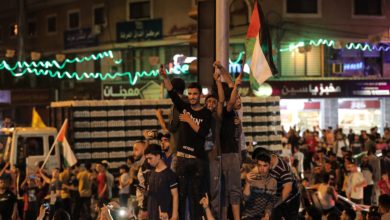Former U.S. attorney general Ramsey Clark denounced the Iraqi Special Tribunal’s death sentences against Saddam Hussein and two co-defendants in a press conference at the National Press Club in Washington on Wednesday, Dec. 20. Clark served on Hussein’s defense team during the trial.
“The consequences of execution will be greater violence.” Clark warned, “I don’t think you can rationally expect anything
|
Noting the biased nature of the trial, which was roundly condemned by human rights groups, foreign offices of several countries, U.N. observers and others, Clark questioned the speed with which the court is moving to execute the defendants.
“Prime Minister Maliki has repeatedly said the execution should take place this year,” Clark said. “Iraqi law seems to provide that the sentence of death is to be carried out mandatorily within fifteen days of the final judgment.” In addition to Saddam, the court also imposed death sentences on Awad Hamed al-Bandar and Barzan al-Tikriti.
The pretext for the recent show trial grew out of an assassination attempt against Hussein and other high ranking Iraqi officials during the Iraq-Iran war. Approximately 148 men were arrested, tried and convicted in the plot. Executions were carried out in Iraq three years after the failed assassination attempt.
Although the recently completed show trial against Saddam and the co-defendants was founded upon the outcome of previous proceedings, transcripts of the proceedings against the would-be assassins were not allowed into evidence.
Further, near the end of the recent trial, an Iraqi puppet judge told one of the defendants, “You had blood on your hands since you were a child.”
There was no attempt to prove that the recent trial was anything other than a rigged show trial. As Clark said, it represented “victor’s injustice, victor’s justice being an oxymoron.”
The implications of execution are dire. Clark noted that “The Pentagon [had] announced that violence in Iraq was at an all time high.”
Although the press conference was primarily focused on the show trial and death sentences, Clark addressed a broader range of issues in response to reporters’ questions. He noted that U.S. troops should leave Iraq and said that the U.S. government should pay tens of billions of dollars in reparations. “We owe it to pay what we owe for what we’ve done.”
Clark openly questioned the Democratic Party leadership, noting that Nancy Pelosi, incoming speaker of the house, failed to mention Iraq when she spoke of the issues Democrats will address in 2007.
Clark also commented on the parallels between Vietnam and Iraq. He observed that long many knew that the U.S. government’s war of aggression against Vietnam was doomed to failure, the war dragged on with massive casualties mounting.
Asked about U.S. policies with regard to Iran, Clark noted that former CIA director William Casey had said the proudest achievement of the CIA was the overthrow of the democratically elected Mossadegh government. This crime placed the Shah of Iran in power as a compliant and brutal U.S. puppet leader before he was overthrown in 1979.
Clark added that any attempt to bring peace to the Middle East will have to address Palestinian rights. “I think every Arab person identifies with the plight of the Palestinians.”
The Hussein show trial
The Dujail show trial was a centerpiece of the U.S. government’s attempts to show that there has been progress in the colonial occupation of Iraq.
U.S. administrations worked hard to demonize Hussein and other Iraqi leaders for at least 15 years. Revolutionaries and progressives should not be swayed by this propaganda.
Saddam Hussein’s role in Iraqi history should be evaluated in the context of the 1958 Iraqi revolution and its aftermath. He represented a strongly anti-communist wing of the Arab Baath Socialist Party, which was engaged in a violent struggle against communists and other leftists, including some within the Baath Party itself.
At the same time, much like European social democratic parties, it combined its violent anti-communism with programs of social reforms that benefits sections of the masses as well as Iraq’s national development.
Baathists in Iraq represent the aspirations of a nationalist bourgeoisie working to overcome the legacy of colonialism. As a result, the Baathist governments had a complex, contradictory relationship with imperialism. At times they collaborated, while at other times they confronted the imperialist powers.
Hussein collaborated with the United States in launching the 1980 war with Iran. But the Iraqi regime was never a comprador, puppet government of U.S. imperial interests in the same way as the client regimes in Jordan, Kuwait or Saudi Arabia.
When Hussein began to assert Iraqi national interests independent of U.S. imperialist interests—for example, the 1990 invasion of Kuwait—his regime was targeted for destruction.
The real reason Hussein and members of his government face execution is because they stood up to U.S. imperialism.
The illegal U.S. occupation regime had no authority to try or convict Hussein or any of his co-defendants. Real trials for “crimes against humanity” would have Bush administration officials and Pentagon generals as the defendants.
Click here to read more from PSL about the Hussein show trial.





